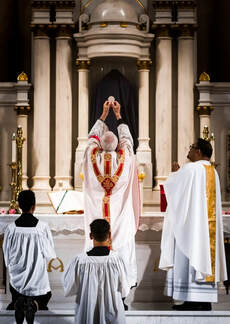
In July a study reported that half of American Catholics are unaware of the Catholic Church’s definition of the Holy Eucharist. In August a second study reported that only one third of American Catholics believe that the Eucharist is the physical body and blood of Christ. I myself didn’t understand or believe it until my first year of college. An Evangelical friend pointed out that that I believed the host changed from bread to actual flesh during the Mass. “I don’t believe that!” I assured him. But I later discovered that, indeed, this was something my four years of Catholic schooling and eight years of catechism classes didn’t get through to me. I was clueless, and apparently most Catholics are clueless, about an essential belief of our own faith.
Yesterday I made that phone call to a nice woman who was raised Catholic and had attended a prestigious Catholic university. At communion time on Sunday, her dear mother, who is suffering the advanced stages of Alzheimer’s, plucked the host from her mouth and dropped it on the communion plate. The priest was a bit frazzled, and indicated to her caregiver that probably the time had come for her not to receive Holy Communion any longer. He didn’t have time, at the communion rail, to explain more fully, and the family was understandably concerned. They sought out the priest after Mass, but his custom is to pray some minutes after Mass in thanksgiving. So they called me, the pastor.
I explained the Sacred Eucharist is the most Holy Sacrament for Catholics, and that priests are custodians of that Sacrament. By canon law the priest must, to the best of his ability, ensure that the Sacred Species is consumed by the communicant. A person who, even if through no fault of their own, discards the Eucharist, cannot be given the Sacrament. I used the analogy of taking car keys away from elderly parents when they are no longer able to drive. There are many reasons why one may be unable to receive the Eucharist (a physical disability, or the unavailability of the Eucharist, or not being in the state of grace), but that God’s grace will reach such people by other means. We talked for a half hour, to no avail. She just could not understand how a priest could deny her mother Holy Communion.
Of course the daughter was motivated by genuine love of her mother. Her inability to understand the objective nature of the Sacrament, however, reflected the terrible failure of catechesis for which we priests and bishops stand accountable. She had faithfully attended twelve years of children’s catechism, and then a Catholic college, but her basic notions of the Eucharist were confused and contradictory. She didn’t receive the Eucharist herself, nor attend Mass, nor believe in many of the Church’s teachings “that are hard for a woman to accept.” Nevertheless, she valued the Eucharist enough to insist on it for her mother.
I’m sorry that I must be blunt, but most Catholics don’t believe in the Eucharist for the simple reason that most clergy don’t believe in the Eucharist. At least, we don’t believe in the Sacrament enough to impart this faith to our parishioners. “Communicating the Eucharist” requires a lifelong commitment to hard work, sacrifice, misunderstandings, and marginalization. And so most of us priests don’t teach and administer the Holy Eucharist with consistency and conviction. If we did, more Catholics would believe in it. Jesus Christ taught the Holy Eucharist with conviction, fully knowing it would get Him crucified. In fact, most of his disciples left him when he insisted on it, as you can read in John 6:35-69. How many bishops today would insist on any Catholic teaching that would turn 90% of their friends into enemies? But that is what the great High Priest Jesus did. Thank God we have a High Priest!
I made another enemy today, and it ruined my day. The woman I talked with will no longer bring her mother to my church, and she will tell all her friends that the priests at Star of the Sea are doctrinaire, intolerant, perhaps even hateful. I knew it was a lose-lose before I returned the call, and perhaps I should not have even called her back. But on the other hand, she deserved a return call, and she deserved the truth. A priest’s job is to deliver the truth, even if he cannot do it very well. I tried the best I could, but my gifts of intellect and empathy are limited. May it not be held against me!


 RSS Feed
RSS Feed